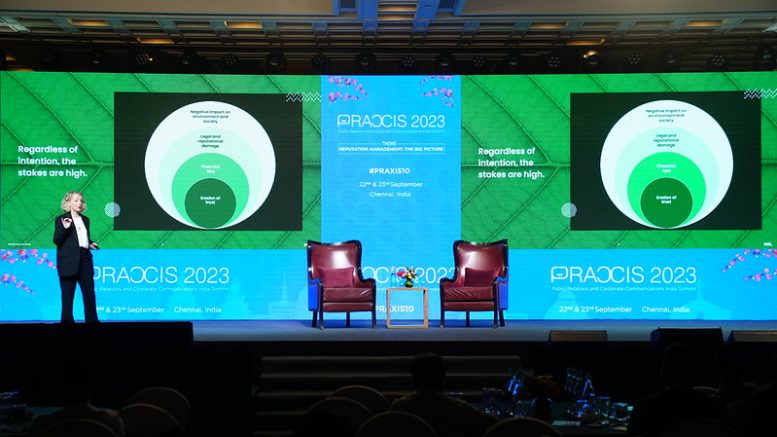“Greenwashing: The Risks and Opportunities of Communicating Sustainability” was the enlightening topic of discussion in the keynote address delivered by Suzy Goulding, Head of Sustainability at AMA, MSL Group. With an insightful exploration of sustainability communications, she unravelled the complexity of greenwashing while emphasizing the crucial role of authenticity in today’s sustainable messaging.
Decoding the Pitfalls of ‘Greenwashing’
Suzy Goulding set the stage for her Keynote Address by showcasing a video that eloquently depicted the challenges associated with sustainability communications. The video, featuring Apple, served as a poignant reminder of the hurdles in conveying sustainable initiatives to audiences effectively.
At the heart of the talk was “greenwashing,” a term that encapsulates the deceptive practice of using communication and marketing strategies to portray an organization’s products, objectives, and policies as environmentally friendly. In a world where the ‘green’ agenda is crucial, greenwashing has become a scourge, particularly for communicators striving to navigate the intricate waters of sustainability. She then referred to Greta Thunberg who commented on the climate delusion: ‘We’ve been greenwashed out of our senses. It’s time to stand our ground’.
The Expanding Lexicon of ‘Greenwashing’
Goulding highlighted the increasing complexity of the sustainability landscape by introducing various terms related to greenwashing. These terms, such as “greencrowding,” “greenlighting,” “greenshifting,” “greenlabelling,” “greenrinsing,” and “greenhushing,” paint a vivid picture of the intricate web of deceptive practices. She urged communicators to delve into the nuances of greenwashing – to better address these challenges. She cited ‘The Alliance to End Plastic Waste: Barely Credible’ report – as an example of how corporates can be seen to be doing something collectively, but individual actions still lack.
Greencrowding: The strategy of blending in with a crowd of corporations to conceal environmentally damaging practices. This approach can create an illusion of collective action while individual actions lack substance.
Greenlighting: Companies that highlight their green credentials in an attempt to divert attention from other environmentally detrimental activities. This often involves emphasizing environmentally friendly aspects while ignoring or downplaying negative impacts.
Integrity Matters: Intent in Greenwashing
Suzy Goulding underscored the importance of intent in evaluating greenwashing cases. “I think ‘intent’ matters when we look at the perpetrators of greenwashing,” she disclosed. Then she presented two examples illustrating the extremes of intent. The first example, involving Innesfree, showcased a deliberate attempt to mislead consumers. In contrast, the second example, a DBS advertisement, revealed a lack of awareness or miscommunication regarding sustainability issues within the brand.
Regardless of intent, greenwashing has far-reaching consequences, impacting trust levels, reputation, and potentially leading to legal consequences. Moreover, it can have macro-level effects, slowing down sustainability efforts and making it challenging for consumers to differentiate between valid and misleading claims.
Compliance & Legislation Driving Change
The reduction of greenwashing practices is primarily being driven by legislation and corporate compliance requirements. In India, advertising regulations explicitly prohibit false claims, and the European Union has introduced stringent legislation that applies to both EU-based and global companies seeking to export to the region.
Despite these changes, examples of egregious greenwashing persist, with instances such as intensive transportation practices and the use of plastic bottles coming to the forefront. Suzy cited H&M’s past issues, where the brand made several misleading claims regarding its “Conscious Collection.”
Recognizing Greenwashing: A Guide for Communicators
To discern greenwashing practices, communicators must look for red flags:
Vague Goals: Companies that set ambitious sustainability goals without clear actions or milestones.
Overreliance on Sponsorships: If a company invests significantly in high-profile sustainability events without a long-term commitment, it may be a distraction from other unsustainable practices.
Overuse of Jargon: Companies that rely heavily on sustainability jargon can confuse consumers. Excessive use of terms like “100% organic,” “certified,” and “approved” can be misleading.
Championing Integrity in Communication
To address these challenges, communicators must adopt an integrity-driven role. Never has it been more important for communicators to be the people that companies can trust to keep them honest and consumers can trust that what we communicate is honest and transparent.
She urged professionals to become the “Integrity Avengers” and uphold transparency and authenticity in communication. By rigorously evaluating sustainability reports, materiality studies, and tracking mechanisms, communicators can hold companies accountable and ensure responsible disclosure.
She exclaimed – “Question everything, and challenge if you can’t find the information or something doesn’t add up”. Boldy putting the point across, she said – “You are the Integrity Avengers! In summary, I suggest we as professional communicators adopt a new role – that of the integrity avenger!” So, Integrity Avengers must question everything, challenge discrepancies, and become the guardians of ethical communication. In doing so, they play a vital role in maintaining the trust of both companies and consumers.
The Rewards of Authenticity
By getting it right and adhering to authentic and transparent communication, businesses can enjoy a multitude of benefits, including:
Better Reputation: Companies with integrity gain greater respect and trust.
Consumer Trust: Trust is a valuable asset in the business world.
Competitive Advantage: Authenticity sets businesses apart in a crowded marketplace.
Investment Opportunities: Ethical and sustainable companies are more appealing to investors.
She concluded her keynote by highlighting a brand that embodies authenticity and sustainability at its core. This exemplifies the true essence of a sustainable business, one that aligns its communication efforts with its values, ensuring a bright and sustainable future.

In a Fireside Chat with Pooja Khan, Panasonic India she put the spotlight on the fact that there is an anti-ESG narrative in the US. How should communicators deal with this challenge? Companies should be clearer that ESG matters. “There’s a lot we can do to build Sustainability. It’s as much about growth as efficiency,” Suzy noted.
Is there any common framework companies can follow? From a company’s perspective, there must be a way to simplify information, she said and added – “You can make a choice on what is actually interesting for your stakeholders”. In India we have seen campaigns on the ESG mode like ‘Rs 100 goes to child education’ etc which is smart marketing, but can this be ‘greenwashing’? Any company serious about this cause, goes a few steps further, she observed and nailed the point – “You cannot go from A to Z immediately!”
The views and opinions published here belong to the author and do not necessarily reflect the views and opinions of the publisher.






Be the first to comment on "Cracking the Code on ‘Greenwashing’: An Insider’s Take"